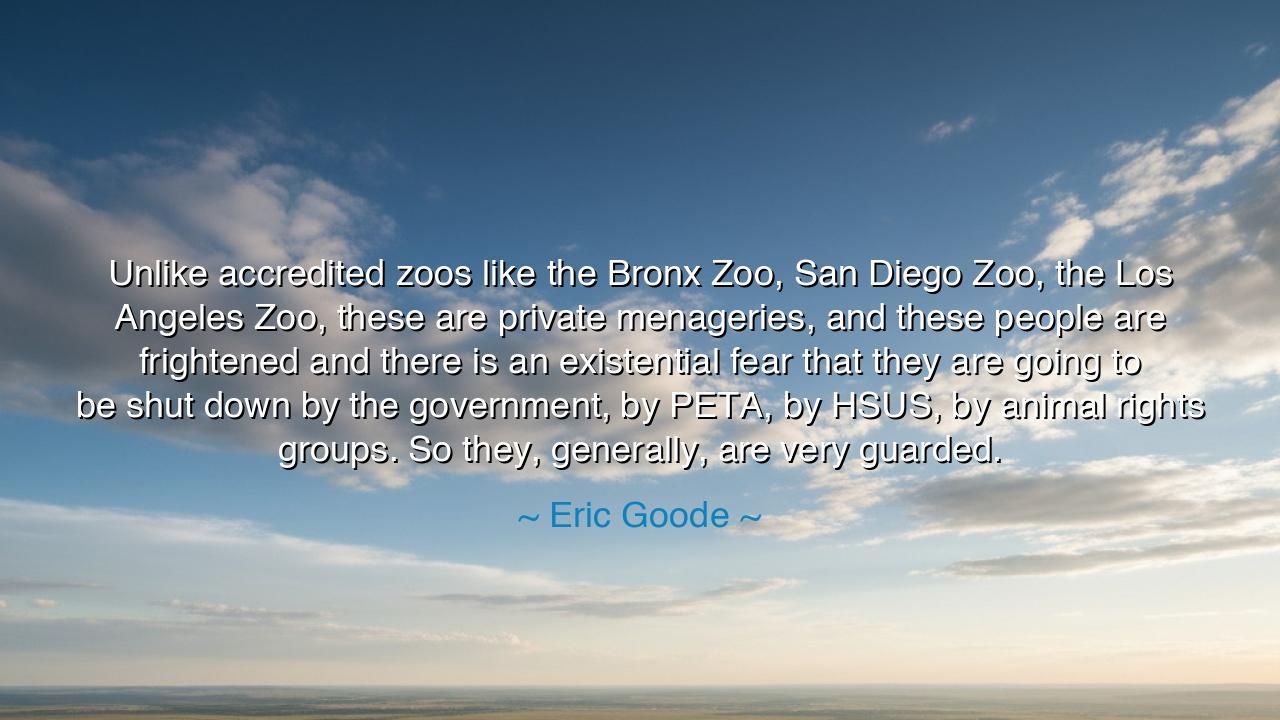
Unlike accredited zoos like the Bronx Zoo, San Diego Zoo, the Los
Unlike accredited zoos like the Bronx Zoo, San Diego Zoo, the Los Angeles Zoo, these are private menageries, and these people are frightened and there is an existential fear that they are going to be shut down by the government, by PETA, by HSUS, by animal rights groups. So they, generally, are very guarded.






Hearken, children of compassion and seekers of understanding, and attend to the words of Eric Goode, who spoke with sober insight: "Unlike accredited zoos like the Bronx Zoo, San Diego Zoo, the Los Angeles Zoo, these are private menageries, and these people are frightened and there is an existential fear that they are going to be shut down by the government, by PETA, by HSUS, by animal rights groups. So they, generally, are very guarded." In these words lies a profound meditation on responsibility, oversight, and the tension between freedom and accountability. Goode reminds us that power, whether over creatures or institutions, is accompanied by both fear and duty, and that governance and oversight are essential to maintain trust and ethical conduct.
The origin of Goode’s insight rests in observation of the world of exotic animal keeping in private hands. Unlike public, accredited institutions with established standards, private menageries often operate in isolation, lacking transparency or regulatory guidance. The operators of these spaces, Goode notes, live under the shadow of scrutiny and potential shutdown, aware that their stewardship is constantly questioned. This anxiety is not mere paranoia, but a reflection of the moral and legal stakes inherent in managing life and safety.
Consider the imagery of existential fear. To tend wild beasts is to shoulder responsibility for life itself, and to face the constant gaze of regulatory bodies, activists, and the law heightens both vigilance and tension. Goode observes that this fear shapes behavior: private menageries are guarded, secretive, and defensive, for any misstep may invite intervention, loss of license, or public condemnation. The very act of stewardship, noble in intent, is shadowed by the weight of external expectation.
History offers vivid exemplars of the perils of unregulated power. In the early 20th century, private circuses and menageries, operating without oversight, often saw tragic accidents, animal suffering, and public scandal. The public outrage that followed led to reforms, regulations, and the emergence of accredited zoos, which established standards of care and transparency. Goode’s reflection reminds us that without accountability, even well-intentioned custodians may falter under pressure, and fear becomes both a shield and a burden.
Goode’s statement also illuminates a broader truth about freedom constrained by responsibility. In private enterprise, the absence of oversight grants autonomy, but it also places individuals under moral and social scrutiny. The very liberty of private menageries carries with it the expectation of ethical conduct, and the fear of intervention enforces a culture of guarded action. This tension mirrors the ancients’ understanding that power, when unchecked, demands constant vigilance to align action with virtue.
The lesson is timeless: ethics and oversight are inseparable from stewardship. To manage life, whether of animals or people, is to accept responsibility, transparency, and accountability. Fear, while uncomfortable, serves as a reminder that liberty without structure can endanger both those in charge and those entrusted to their care. Goode teaches that responsible management requires humility, openness, and recognition of one’s duties to the wider community.
Practical actions emerge naturally: support accredited and regulated institutions that meet high standards of care; advocate for ethical treatment and oversight of private holdings; cultivate transparency in all areas of responsibility; and recognize that stewardship carries moral and social obligations alongside authority. By doing so, one ensures that freedom is exercised with wisdom, accountability, and respect for life.
In sum, Goode’s words illuminate a profound truth: fear, oversight, and responsibility coexist in any sphere of stewardship. Let this wisdom guide custodians, citizens, and leaders alike, ensuring that liberty is tempered by duty, and that guardianship—whether of animals, institutions, or communities—is exercised with integrity, care, and moral vigilance.
If you wish, I can craft an even more epic, mythic version, turning Goode’s reflection into a heroic narrative of stewardship, vigilance, and the moral burdens of freedom—perfect for immersive audio storytelling. Do you want me to do that?






AAdministratorAdministrator
Welcome, honored guests. Please leave a comment, we will respond soon